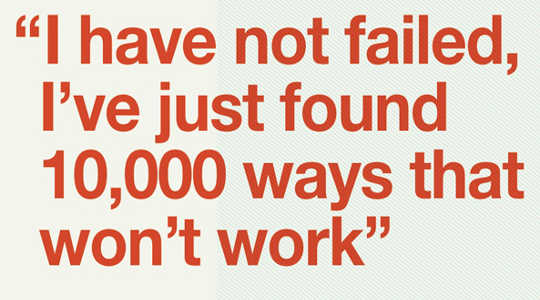 Thomas Edison
Thomas Edison
In the middle of his bar routine – having flung himself into the air with style and skill – Dutch gymnast Epke Zonderland missed the bar at the last grasp and face-planted into the mat.
It appeared for a few seconds that he might have knocked himself out, and the camera panned away while his support team rushed forward. Breaking the tension, Zonderland reappeared sporting a large red mark on his forehead and brushed away concerned teammates. He insisted on completing his routine – and did it beautifully.
These Olympic moments serve as a timely reminder of the magnificent human capacity to bounce back in the face of trauma and strife. But why, in the face of challenge or failure, do some people wilt, while others seem to do over or go again?
The role of personality
In the face of a challenge, some people seem temperamentally pre-inclined to approach that task and try their hand. Others are predisposed to caution and give up before they even start. These two personality types are known as approach motivated and avoidant motivated.
There’s not a lot you can do about your inherent personality style, but the good news is that you can learn ways to build approach motivation.
Most people display an innate enjoyment in participating in activities that provide at least a moderate challenge. Most of us intrinsically know if an assigned task is too easy or seems impossible; we either derive no pleasure from completing the said task, or are inclined not even to try in the first place.
But when we try, fail, try something else, fail, try again and ultimately succeed, we get a nice kick from our dopaminergic reward system. This is how goal accomplishment leads to improved motivation and allows for positive self-reflection when facing future difficulties (I got through a tough patch before, I can do it again).
And this ultimately leads to a willingness to give things a go and builds confidence in our capacity to overcome challenges.
Coping mechanisms
When things go horribly wrong, we tend to cope – broadly – in three possible ways.
-
Problem solving: tackle the problem head on, or at least, tackle some aspect of it. Attempt to solve it and learn from your failures while doing so, in order to solve it better next time.
-
Cognitive reappraisal: think about the problem differently, focus on the silver lining, or be grateful for some secondary opportunities or outcomes that may have arisen from the problem.
-
Emotion: attempt to deal with negative emotions – vent, cry, drink alcohol, eat masses of comfort foods such as ice-cream or sweets. Or – slightly better – exercise or meditate.
A large body of research demonstrates that the effectiveness and impact on mental well-being of employing these coping styles are in the order numbered above. Your best bet is to go with problem solving; your worst outcomes will arise from merely trying to stuff away the emotion.
Here again, you can see how a continuing willingness to try different problem-solving solutions leads to a tendency to re-approach a task at which you initially failed, and that builds motivation to persist in times of trouble.
So, when, like Zonderland, we mess up (or have an accident), we must try to get up. In doing so, we invoke psychological mechanisms that transform a failed experience into putting some extra fight into the dog.
And for all of our sophisticated, modern psychological understanding of these processes, we would do well to remember that all of this was well known by our forefathers. As Winston Churchill once said:
When you are going through hell, keep going.
About The Author
Rachael Sharman, Lecturer in Psychology, University of the Sunshine Coast
This article was originally published on The Conversation. Read the original article.
Related Books
at

Thanks for visiting InnerSelf.com, where there are 20,000+ life-altering articles promoting "New Attitudes and New Possibilities." All articles are translated into 30+ languages. Subscribe to InnerSelf Magazine, published weekly, and Marie T Russell's Daily Inspiration. InnerSelf Magazine has been published since 1985.

Thanks for visiting InnerSelf.com, where there are 20,000+ life-altering articles promoting "New Attitudes and New Possibilities." All articles are translated into 30+ languages. Subscribe to InnerSelf Magazine, published weekly, and Marie T Russell's Daily Inspiration. InnerSelf Magazine has been published since 1985.






















